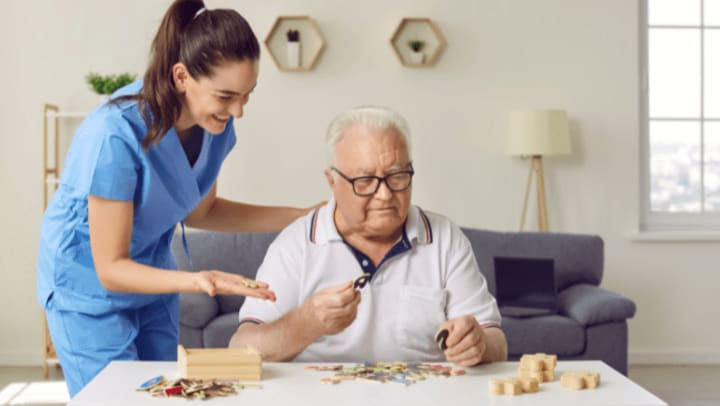Caring for someone with dementia is both challenging and fulfilling. Ensuring their safety, well-being, and quality of life is essential as the disease progresses. In this comprehensive guide, we'll explore the key aspects of dementia care in Nichols Hills, equipping you with the necessary knowledge and practical tips to provide the best possible support for your loved one.
Understanding Dementia and Its Challenges
Dementia is a general term for conditions affecting a person's memory, thinking, and behavior. Alzheimer's disease is the most common type of dementia, but other forms exist, such as vascular dementia, Lewy body dementia, and frontotemporal dementia.
Dementia can present a range of challenges, including memory loss, confusion, difficulty with communication, changes in mood and behavior, and a diminished ability to perform daily activities. As the disease progresses, these challenges can become more pronounced, requiring a well-rounded care plan to address the evolving needs of your loved one.
Dementia-Friendly Design
-
Eliminate Hazards: Remove potential tripping hazards, such as loose rugs or cords, and install safety features like grab bars in the bathroom and stair gates.
-
Simplify the Environment: Reduce clutter, keep furniture and décor to a minimum, and use clear signage to help your loved one navigate their surroundings.
-
Establish a Routine: Develop a consistent daily routine to provide a sense of structure and security.
Effective Communication Techniques for Dementia Care
-
Speak Slowly and Clearly: Use simple language, avoid complex questions, and give your loved one time to process and respond.
-
Maintain Eye Contact: This helps to keep your loved one engaged and focused during conversations.
-
Validate Emotions: Acknowledge and validate your loved one's feelings, even if they don't make logical sense.
Managing Daily Activities and Routines for Someone with Dementia
-
Create a Schedule: Establish a regular daily routine with activities, meals, and rest periods.
-
Break Down Tasks: Simplify and break down complex tasks into smaller, more manageable steps.
-
Encourage Independence: Allow your loved one to participate in activities they can still do independently, such as getting dressed or preparing a simple meal.
Promoting Emotional Well-being and Reducing Agitation
-
Recognize Triggers: Pay attention to your loved one's reactions to see if specific things upset or distress them.
-
Provide Comfort and Reassurance: Use a calm, soothing voice and physical touch, such as a gentle hug or hand-holding, to help your loved one feel safe and secure.
-
Manage Stress and Fatigue: Ensure your loved one gets enough rest, and consider implementing relaxation techniques, such as deep breathing or meditation.
Nutritional Considerations for Dementia Care
-
Encourage Hydration: Offer water, juices, or other hydrating beverages throughout the day to prevent dehydration.
-
Provide Nutrient-Dense Foods: Focus on foods high in protein, vitamins, and minerals, such as fruits, vegetables, lean meats, and whole grains.
-
Explore Dietary Supplements: If your loved one struggles to maintain a healthy diet, ask their healthcare provider about supplements that could help.
Practical Tips for Personal Care and Hygiene
-
Establish a Routine: Develop a consistent bathing, grooming, and dressing routine to provide a sense of familiarity and security.
-
Use Adaptive Equipment: Invest in tools like grab bars, non-slip mats, and specialized clothing to make personal care tasks safer and more manageable.
-
Encourage Independence: Allow your loved one to participate in personal care tasks to the best of their ability, even if it takes longer.
Engaging in Meaningful Activities and Cognitive Stimulation
Engaging your loved one in meaningful activities and cognitive stimulation can help maintain their skills, improve mood, and enhance their overall well-being. Consider the following strategies:
-
Tailor Activities to Interests: Identify activities your loved one enjoys, such as listening to music, gardening, or arts and crafts.
-
Incorporate Sensory Experiences: Engage your loved one's senses through cooking, baking, or exploring different textures and scents.
-
Provide Cognitive Stimulation: Engage your loved one in brain-stimulating activities, such as puzzles, memory games, or reminiscing about their life experiences.
Providing the Best Care for Your Loved One with Dementia
Caring for a loved one with dementia is a journey that requires patience, understanding, and a deep commitment to their well-being. By creating a safe and supportive environment, fostering open and respectful communication, and implementing effective care strategies, you can help them maintain their dignity, independence, and quality of life for as long as possible. Remember, your love and support can significantly impact their daily lives.
If you or a loved one is living with dementia in the Nichols Hills area, consider contacting our team of experienced dementia care specialists at Iris Memory Care of Nichols Hills. We can provide personalized support, resources, and guidance to help you navigate this journey. Contact us today at (405) 286-9500 to learn more about our dementia care services.


